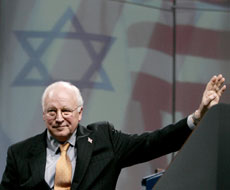|
Iran-US "Threats" Flare Over Nuclear Standoff
 |
|
"If anyone wants to violate the rights of the Iranian nation, they will quickly regret their actions," said
Ahmadinejad.
|
VIENNA,
March 8, 2006 (IslamOnline.net & News Agencies) – Iran's nuclear
standoff with the West took a dangerous turn Wednesday, March 8, with
the Islamic Republic threatening Washington with "pain" if
the United Nations Security Council acts against it.
"The
United States may have the power to cause harm and pain but it is also
susceptible to harm and pain. So if the United States wishes to choose
that path, let the ball roll," Iran said in a statement obtained
by Reuters on the sidelines of a UN nuclear watchdog board meeting in
Vienna.
"There
are two options before us. Either to compromise and cooperate or go
for confrontation. We hope and spare no effort that the first option
will be realized," it added, alluding to now stalled diplomacy to
resolve the crisis.
President
Mahmoud Ahmadinejad further vowed that the West would
"regret" choosing to step up pressure on the Islamic
republic.
"If
anyone wants to violate the rights of the Iranian nation, they will
quickly regret their actions," he said in a speech to thousands
of supporters in the western province of Lorestan.
Asked
whether Iran would use an "oil weapon" as the world's No. 4
crude exporter, Javad Vaeedi, deputy secretary of Iran's Supreme
National Security Council, told Reuters in Vienna: "We will not
(do so now), but if the situation changes, we will have to review our
oil policies."
A
diplomat close to the UN's nuclear agency told AFP Wednesday the UNSC
is to meet next week on Iran's nuclear program, adding that the
International Atomic Energy Agency (IAEA) should finish considering
later Wednesday a report by the UN agency's director on Iran's nuclear
program.
The
report says Iran has resumed uranium enrichment activities in defiance
of demands by the international community to halt work.
Iran
says its nuclear program is a peaceful drive for civilian energy. The
West, in contrast, fears it is hiding a covert push for the atom bomb.
An
Iranian collision course with the council looked more likely after
Tehran brushed aside a Russian offer to let it do some atomic research
if it refrained from enriching uranium on an industrial scale for 7-9
years.
The
United States and the EU big three Britain, France and Germany also
rebuffed the idea because they said it would not have prevented Iran
perfecting bomb technology via enrichment research.
"Meaningful
Consequences"
 |
|
"For our part, the United States is keeping all options on the table," said Cheney.
|
The
statement came only a day after US vice-president Dick Cheney warned
Tuesday of "meaningful consequences" if Iran proved adamant.
"The
Iranian regime needs to know that if its stays on its present course,
the international community is prepared to impose meaningful
consequences," he said in a speech to speaking to the pro-Israel
lobbying group AIPAC, Reuters reported.
Cheney
also reaffirmed that the United States was keeping all options on the
table.
"For
our part, the United States is keeping all options on the table. ...
We will not allow Iran to have a nuclear weapon," Cheney said.
Senior
US officials have repeatedly refused to rule out the use of force,
saying "all options are on the table."
For
the past year, the administration has focused on supporting diplomatic
efforts led by key the EU big three but US rhetoric has become more
muscular as diplomacy failed to resolve the issue.
The
Sunday Telegraph revealed last month that the US was drawing up plans
for "devastating" bomb raids backed by submarine-launched
ballistic missile attacks against Iran's nuclear facilities as a
"last resort."
Top
Iranian negotiator Ali Larijani warned Monday, March 6, that the
United States risks falling into the same trap in Iran as it did in
Iraq if it attacked Tehran.
The
US government was engaging in "psychological warfare" in a
bid to haul Iran before the UN Security Council, which could consider
economic sanctions and eventually even military action, Larijani told
the BBC television.
Just
as in Iraq, the United States wants to suggest falsely it has
international backing for its position, he claimed, insisting Iran had
the right to build what he described as a peaceful nuclear program.
|